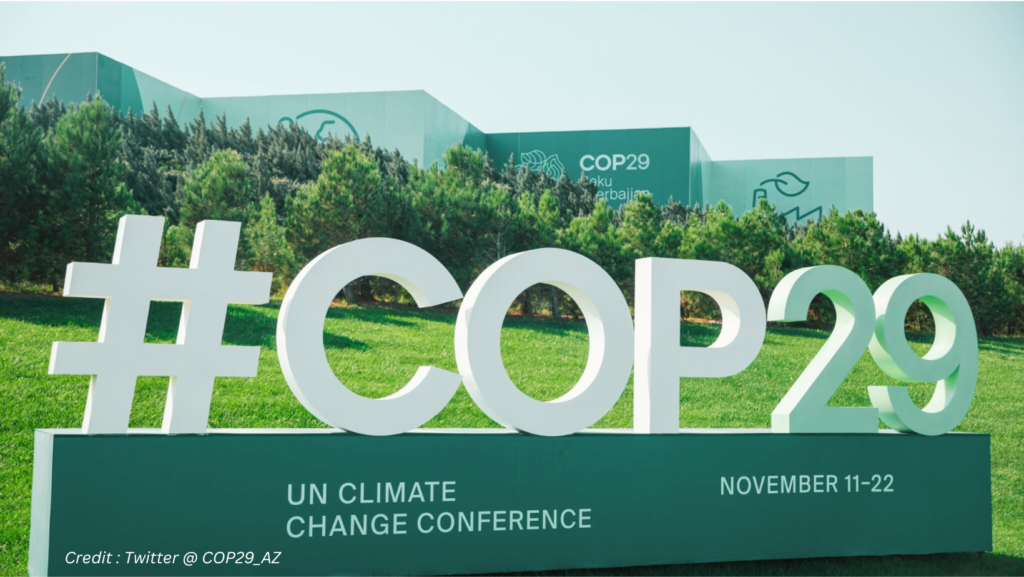Baku, Azerbaijan/New York, November 8, 2024 – The 29th UN Conference on Climate Change will open next week in Azerbaijan amid catastrophic devastations happening around the world, caused by severe floodings and wildfires among others, and an unprecedented global warming this year.
Heads of governments, business and civil society are expected to offer new ideas and initiatives to fight the climate at the 29th Conference of the Parties to the UN Framework Convention on Climate Change (COP29), taking place in Baku, Azerbaijan, from November 11 to 22.
The UN said the conference will seek an agreement on a new climate finance goal that would ensure that every country has the means to take much stronger climate action, slash greenhouse gas emissions and build resilient communities.
The conference is required to help unlock trillions of dollars needed by developing countries to mitigate harmful carbon emissions, adapt to climate change and cope with the loss and damage it has caused.
UNEP: Focus on finance as world off track on emission cuts – The UN Environment Program (UNEP) urged COP29 to focus on finance as it released its Emissions Gap Report 2024 with a warning that without more ambitious cuts to greenhouse gas emissions, the world is on track for a temperature increase of 2.6°C-3.1°C this century, a rise that would be “debilitating” for the planet.
The report confirmed that global average temperature has risen to near 1.5°C above pre-industrial levels. It said if such temperature rise would continue the global temperature would reach the catastrophic level of 2.6-3.1°C this century unless emissions are drastically cut.
“Climate change is already devastating communities across the world, particularly the most poor and vulnerable. Raging storms are flattening homes, wildfires are wiping out forests, and land degradation and drought are degrading landscapes,” said Inger Andersen, Executive Director of UNEP.
“People, their livelihoods and the nature upon which they depend are in real danger from the consequences of climate change. Without action, this is a preview of what our future holds and why there simply is no excuse for the world not to get serious about adaptation, now.”
The report said countries must slash emissions by 42 per cent by 2030 in order to limit global warming to 1.5°C above pre-industrial levels, one of the key goals of the Paris Agreement on climate change.
On the issue of adaptation finance, the report said flows of funds to developing countries increased from US$ 22 billion in 2021 to US$28 billion in 2022, which is still a fraction of the US$187-359 billion needed annually in adaptation finance.
The report said countries under the Paris Agreement are required in 2025 to deliver updated plans for how they will reduce greenhouse gas emissions and adapt to climate change. It said COP29 is expected to issue calls for these pledges, known as nationally determined contributions (NDCs), to be bold.
The report said COP29 will also discuss the loss and damage fund, which was launched at last year’s COP28 in Dubai. The fund was designed to assist countries hit by climate change and its consequences such as the loss of human lives, damage to infrastructure and the failure of crops.
WMO: Demands for climate services have increased – Just days before the Baku conference, the World Meteorological Organization (WMO) issued The State of Climate Services report, which said that climate change impacts have intensified and demands for climate services to support mitigation, adaptation and increase resilience have spiked.
“In the past five years, there has been progress in provision of this climate information for decision-making, but big gaps remain and investment lags far behind needs,” the report said.
“In the face of unprecedented environmental challenges, the development, delivery and use of climate information to enable climate action has never been more crucial,” WMO Secretary General Celeste Saulo said.
The report said of the $63 billion allocated to climate adaptation, only about $4 to $5 billion explicitly supports climate services and early warning activities.
“We need to make necessary investments for a sustainable future, The cost of no action is several times higher than the cost of action,” Saulo said.
(By J. Tuyet Nguyen)
United Nations journalists – United Nations journalists – United Nations journalists
United Nations News – United Nations News – UN Correspondents Association – UNCA Awards

